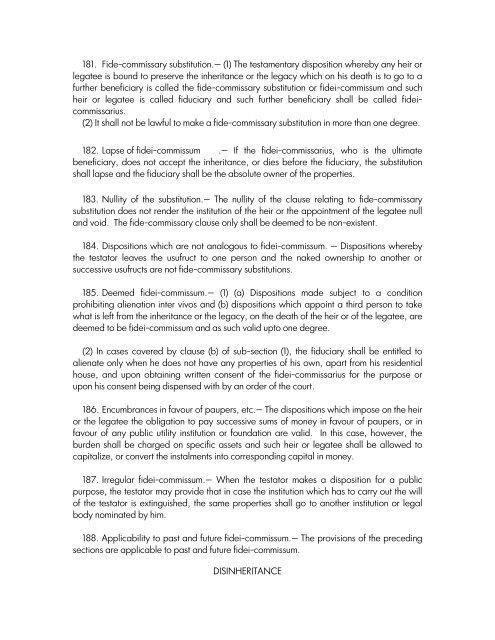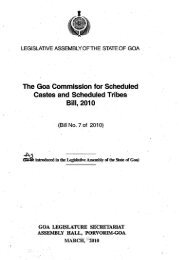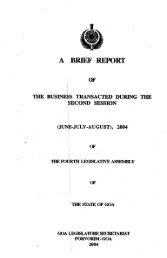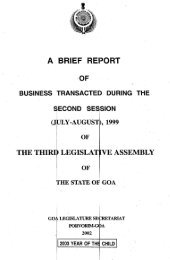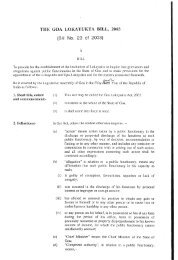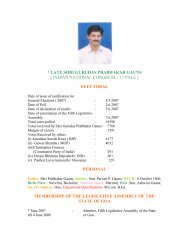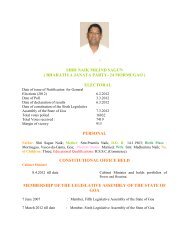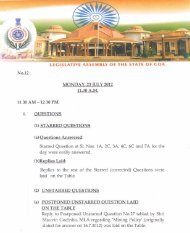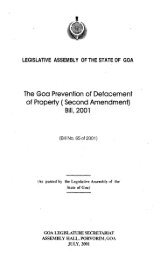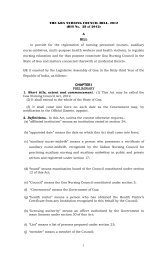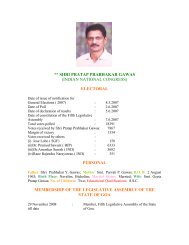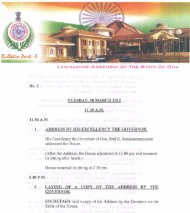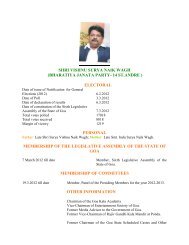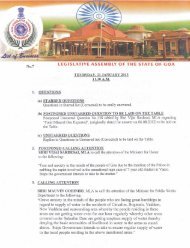bill as introduced - Goavidhansabha.gov.in - Welcome to Goa ...
bill as introduced - Goavidhansabha.gov.in - Welcome to Goa ...
bill as introduced - Goavidhansabha.gov.in - Welcome to Goa ...
You also want an ePaper? Increase the reach of your titles
YUMPU automatically turns print PDFs into web optimized ePapers that Google loves.
181. Fide-commissary substitution.— (1) The testamentary disposition whereby any heir or<br />
legatee is bound <strong>to</strong> preserve the <strong>in</strong>heritance or the legacy which on his death is <strong>to</strong> go <strong>to</strong> a<br />
further beneficiary is called the fide-commissary substitution or fidei-commissum and such<br />
heir or legatee is called fiduciary and such further beneficiary shall be called fideicommissarius.<br />
(2) It shall not be lawful <strong>to</strong> make a fide-commissary substitution <strong>in</strong> more than one degree.<br />
182. Lapse of fidei-commissum .— If the fidei-commissarius, who is the ultimate<br />
beneficiary, does not accept the <strong>in</strong>heritance, or dies before the fiduciary, the substitution<br />
shall lapse and the fiduciary shall be the absolute owner of the properties.<br />
183. Nullity of the substitution.— The nullity of the clause relat<strong>in</strong>g <strong>to</strong> fide-commissary<br />
substitution does not render the <strong>in</strong>stitution of the heir or the appo<strong>in</strong>tment of the legatee null<br />
and void. The fide-commissary clause only shall be deemed <strong>to</strong> be non-existent.<br />
184. Dispositions which are not analogous <strong>to</strong> fidei-commissum. — Dispositions whereby<br />
the testa<strong>to</strong>r leaves the usufruct <strong>to</strong> one person and the naked ownership <strong>to</strong> another or<br />
successive usufructs are not fide-commissary substitutions.<br />
185. Deemed fidei-commissum.— (1) (a) Dispositions made subject <strong>to</strong> a condition<br />
prohibit<strong>in</strong>g alienation <strong>in</strong>ter vivos and (b) dispositions which appo<strong>in</strong>t a third person <strong>to</strong> take<br />
what is left from the <strong>in</strong>heritance or the legacy, on the death of the heir or of the legatee, are<br />
deemed <strong>to</strong> be fidei-commissum and <strong>as</strong> such valid up<strong>to</strong> one degree.<br />
(2) In c<strong>as</strong>es covered by clause (b) of sub-section (1), the fiduciary shall be entitled <strong>to</strong><br />
alienate only when he does not have any properties of his own, apart from his residential<br />
house, and upon obta<strong>in</strong><strong>in</strong>g written consent of the fidei-commissarius for the purpose or<br />
upon his consent be<strong>in</strong>g dispensed with by an order of the court.<br />
186. Encumbrances <strong>in</strong> favour of paupers, etc.— The dispositions which impose on the heir<br />
or the legatee the obligation <strong>to</strong> pay successive sums of money <strong>in</strong> favour of paupers, or <strong>in</strong><br />
favour of any public utility <strong>in</strong>stitution or foundation are valid. In this c<strong>as</strong>e, however, the<br />
burden shall be charged on specific <strong>as</strong>sets and such heir or legatee shall be allowed <strong>to</strong><br />
capitalize, or convert the <strong>in</strong>stalments <strong>in</strong><strong>to</strong> correspond<strong>in</strong>g capital <strong>in</strong> money.<br />
187. Irregular fidei-commissum.— When the testa<strong>to</strong>r makes a disposition for a public<br />
purpose, the testa<strong>to</strong>r may provide that <strong>in</strong> c<strong>as</strong>e the <strong>in</strong>stitution which h<strong>as</strong> <strong>to</strong> carry out the will<br />
of the testa<strong>to</strong>r is ext<strong>in</strong>guished, the same properties shall go <strong>to</strong> another <strong>in</strong>stitution or legal<br />
body nom<strong>in</strong>ated by him.<br />
188. Applicability <strong>to</strong> p<strong>as</strong>t and future fidei-commissum.— The provisions of the preced<strong>in</strong>g<br />
sections are applicable <strong>to</strong> p<strong>as</strong>t and future fidei-commissum.<br />
DISINHERITANCE


